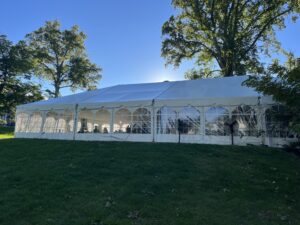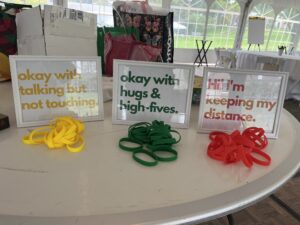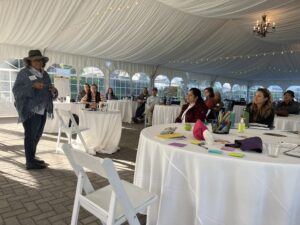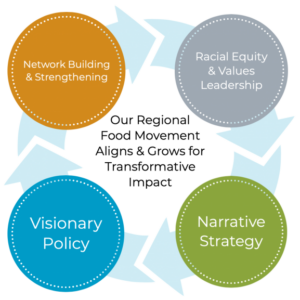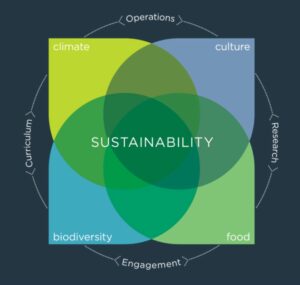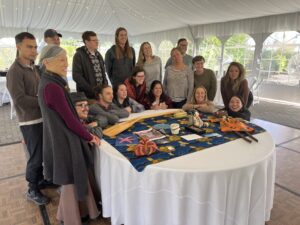Care, Trust, Truth and Belonging: Themes From a Network Leadership Institute Re-Launch
October 17, 2022 Leave a comment* * * * *
“We now know what each other is made of. We can start weaving this beautiful tapestry, this community.”
“I don’t want to wait another 8 months until we are back in person!”
“I want others to know about this. I’ve never experienced anything like this. Others should know about this.”
The three quotes above came from participants in the newest Food Solutions New England (FSNE) Network Leadership Institute cohort, at the close of our opening session two weeks ago. After a year of doing an on-line only Institute, we made the decision to move to a hybrid model for this sixth annual offering, launching and concluding in-person during the warmer months (September and June) and going on-line for five sessions during the colder months late fall through early spring 2023.
Like so many, we weighed many considerations before making this choice. As one participant said during the session, “Many of us had to push through vulnerabilities to be here.” Ultimately we felt we really needed to tap into the power of the in-person gathering to ground people and set an energetic tone for the rest of the program. Many conversations were had about COVID protocols that would ensure safety without being overly onerous. This ended up including a wrist band system (see photos below), testing the day before, at arrival and after upon returning home (tests provided by the program), meeting for the bulk of the time outdoors in a tent with plenty of ventilation, light and spacing, and making masks available for those who wanted them, when we met or ventured indoors.
The tone we aimed to set from the outset was one of community care and belonging, acknowledging that for some this would be a new and welcome experience, and others may well be feeling anxious and uncertain. Hosting is always a spirit we aim to bring to the Institute, whether in-person or virtual, and includes working to ensure that everyone feels welcome and that their well-being is front and center. This included providing clear information on the front end around expectations and supports, a warm welcome upon arrival, a care package of local/regional food items (appropriate to our common work), keeping food and beverages available and setting a tone of ease and enjoyment (fidget items on tables, art supplies and a diverse music playlist).
Since 2016, IISC has been partnering with the FSNE Backbone Team from the University of New Hampshire’s (UNH) Sustainability Institute, to support and connect people in this region who are committed to advancing the emergence of just, sustainable, collaboratively stewarded and self-determined food futures for all who live here. This network and leadership development offering initiative grew out of system mapping that FSNE undertook several years ago to identify areas of leverage to shift extractive, inequitable and life-depleting patterns of the dominant food system.
More recently, the network has honed its focus on four overlapping impact areas as its unique and essential contribution, complementing those of its partners in the region, to bringing the FSNE vision and values for food system transformation to life. The Network Leadership Institute (NLI) is an outgrowth of both Network Building & Strengthening as well as Racial Equity & Values Leadership, but also touches on the other two areas as well in its content.
From the start, we knew that the main value of any kind of leadership development program would be in the people that came together and the relationships they built with one another. You only need to read about the current cohort to feel how much potential there is in simply creating opportunities for these individuals to connect and identify as more of a collective! From there, we were interested in connecting those involved in the program with other values-aligned change agents in the region. In addition, we looked at giving people an experience of different and diverse places in our region (rural, urban, coastal) and to see their work in a regional context. Lastly, we wanted to offer an opportunity for participants to hone their skills as collaborative/network leaders and social (especially racial) equity champions.
This year’s program integrates all of these elements, again with a particular theme of care and welcome. What we heard from this year’s cohort was how this was very much appreciated and built over the course of the more than 24 hours we were together. Here are some highlights of the programmatic progression that were intended to contribute to our themes of care, trust, truth and belonging:
- We began by breaking bread together, at small tables, in the tent. Good food, relaxing music and informal introductions were meant to help people land softly.
- We formally opened, as we generally do during FSNE gatherings, with an offering and a grounding exercise. The offering might be a poem, a quote, a song, a short story, a dance …. We read one of our favorite stanzas of poetry from William Stafford’s “A Ritual to Read to Each Other,” (see below), again to set a tone for the session, and then led people who were interested (making sure to let people know it was voluntary) through an embodied exercise to ground bodies/nervous systems, honor feelings and any thoughts people might be having as we got going.
- We were joined by NLI alum Rachel Sayet, a Mohegan tribal member, Indigenous educator, essential oil crafter and Reiki practitioner, to provide some background on the land on which we were meeting and the history and present of Indigenous peoples who have stewarded them. This included the terrible and truthful telling of the actions of Lord Jeffrey Amherst, for whom the town in which we were meeting is still named, as well as efforts by indigenous educators and students in the area to reclaim their foodways and advance food sovereignty.
If you don’t know the kind of person I am
and I don’t know the kind of person you are
a pattern that others made may prevail in the world
and following the wrong god home we may miss our star.
- We introduced everyone to the Welcome Table ritual, through which people share objects that are meaningful to and say something about them, and share a bit of that story. At the end of our session, participants are invited to take their object back and say what they have gained during their time with the group. People always remark how “deep” this goes very quickly in helping people get a sense of one another.
- We collaboratively built community care agreements, by consensus, first by inviting people to consider their self-care practices and then inviting them into conversation with one another about what might support the entire “village.” We guided them through one of the Liberating Structures practices known as 1-2-4-All for this.
- We introduced people to a brief history of the University of New Hampshire’s Sustainability Institute, the Backbone Organization (convenor, coordinator, communicator and fundraiser) for Food Solutions New England, how it defines “sustainability” broadly (including cultural diversity and social equity) as well as the history and current reality of FSNE. In presenting this, we made clear that this new cohort was already a part of FSNE and we welcomed their contributions not just to the Institute, but its various other programs and initiatives.
- We started our second day by sharing a land acknowledgment in the form of a poem (another favorite – “Being Human” by Naima Penniman) that personalizes our connections to the Earth). And we shared an offering with some of the same themes in the form of a quote by Penobscot educator and advocate Sherri Mitchell ((Weh’na Ha’mu’ Kwasset) from her book Sacred Instructions: Indigenous Wisdom for Living Spirit-Based Change (see below), which encourages the reader/listener to attune to the rhythms in the natural world for greater ease and alignment.
“When we merge our internal rhythms with the rhythms of creation, we develop grace in our movement, and without thought or effort we are able to slide into the perfectly choreographed dance of life.”
- On our second day we also invited offerings from the cohort members, whoever felt moved to do so. There were three – a short personal story, a reading and a poem. We look forward to more over the course of our next six sessions!
- We invited people to get artistically expressive through illustrating their River of Life– with crayons, pencils, markers – and naming where they are in their leadership/change agency journeys. They then were invited to share these in trios and talk about how they want the Institute to support them moving forward, and what their intentions were for learning from and contributing to the program and one another’s journeys.
- We delved into Facilitative Leadership for Social Change, our collaborative skills curriculum for the program, and led off with the practice of “Balancing Dimensions of Collaborative Success: Results, Process, Relationship.” This practice includes a small group challenge exercise (building a tower) that tends to bond people (lots of laughter) and helps them think about the trust, care, truth and belonging that is needed to ensure long-term “success” in collaborative change work.
Mutual trust, holistic care, truth-telling and equitable belonging. Those words were expressed throughout our first session in one form or another, in word and in deed, by the hosting team, guests and by the participants. It was evident how these were not just ideas, but becoming part of the collective body that will carry this program and network forward, as we move into an on-line season. “That’s okay,” said one participant,” as some bemoaned going back to more life on Zoom, “we know each other now. That will stay with us.” And we are delighted to already see one subset of the group looking to meet in person soon in the southeast of our region.
This is how we do and will do it, as the poet Marge Piercy writes in two stanzas of her poem “Seven of Pentacles” (see below image) …
Weave real connections, create real nodes, build real houses.
Live a life you can endure: Make love that is loving.
Keep tangling and interweaving and taking more in,
a thicket and bramble wilderness to the outside but to us
interconnected with rabbit runs and burrows and lairs.
Live as if you liked yourself, and it may happen:
reach out, keep reaching out, keep bringing in.
This is how we are going to live for a long time: not always,
for every gardener knows that after the digging, after
the planting,
after the long season of tending and growth, the harvest comes.
